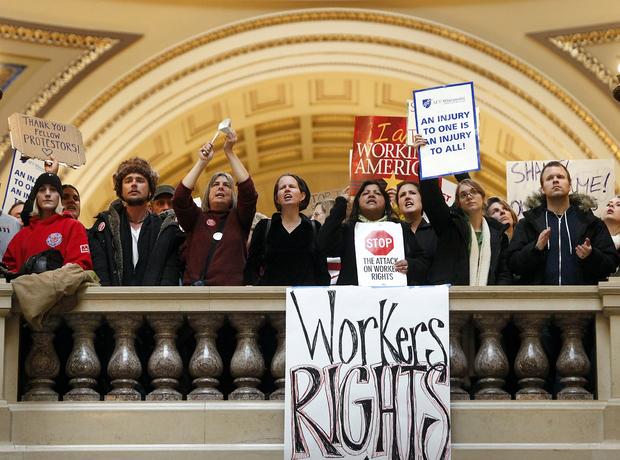Judge blocks Wisconsin union collective bargaining law
A county judge in Wisconsin today issued a temporary restraining order against Wisconsin's controversial anti-union bill, giving liberal opponents of the bill more time to organize resistance to the measure before it can officially become law.
Dane County Circuit Judge Maryann Sumi issued the temporary order today after hearing opening arguments in a suit against the law, the Milwaukee Journal Sentinel reports. A Dane County official filed suit against the measure, charging that Republican politicians broke the law when they passed the bill without giving 24 hours notice before the vote.
The measure, which would scale back most public workers' collective bargaining rights, was backed by Republican Gov. Scott Walker. It engendered intense opposition from Democrats, unions and union supporters. Massive protests took place in Wisconsin for weeks as the legislature considered the bill, and all of the Wisconsin state senators fled the state in February to stall a vote on the measure.
State Senate Republicans, however, tweaked the bill so that they could pass it without Democrats present, and the state Assembly quickly passed the new version.
Walker signed the bill last week, and until today's restraining order went into place, it was slated to officially become law on March 25.
Republicans deny they violated the state's open meetings law, which requires 24 hours' public notice of meetings or two hours' notice in the case of emergencies, but the Dane County official who filed the suit says the legislative committee in charge of the bill did not give two hours' notice. Judget Sumi said today the case against the state was likely to win, the Journal Sentinel reports.
"It seems to me the public policy behind effective enforcement of the open meeting law is so strong that it does outweigh the interest, at least at this time, which may exist in favor of sustaining the validity of the (law)," she said.
Cullen Werwie, a spokesman for the governor, said said in a statement that Walker is "confident the provisions of the budget repair bill will become law in the near future."
Assistant Attorney General Steven Means suggested the state may appeal the ruling, according to the Journal Sentinel, but also pointed out that the legislature could try to just re-enact the bill.
As the conflict over union rights continues, lawmakers in Wisconsin are struggling to repair relations and move on with other business. It seems unlikely, however, that the acrimony will die down. Not only is the lawsuit against Walker's bill still pending, but several recall efforts against state lawmakers from both parties are also underway.

